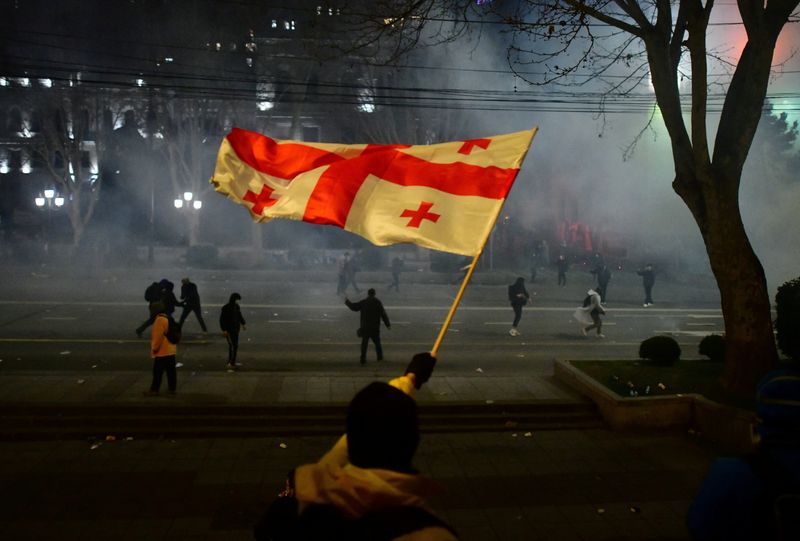By Jake Cordell
TBILISI (Reuters) -Ruling lawmakers in the South Caucasus country of Georgia on Thursday scrapped plans to introduce what critics called a Russian-inspired "foreign agents" law after two days of intense street protests in the capital Tbilisi.
Here is a guide to what's going on:
WHAT IS THE PROPOSED 'FOREIGN AGENTS' LAW?
- Individuals, civil society organisations and media outlets that receive 20% of their funding from abroad would have been required to register as an "agent of foreign influence" with the Georgian Justice Ministry.
- Organisations would have to meet what Human Rights Watch described as "onerous reporting requirements and inspections" and would face fines of up to 25,000 Georgian lari ($9,600) for failing to comply, with prison sentences of up to five years for repeated offences.
- Swathes of Georgian civil society, including election monitors, corruption watchdogs and independent media outlets would have been covered by the law.
- Rights groups say the "foreign agent" tag is a designed to make it easier for the government to discredit its opponents.
WHY WAS IT INTRODUCED?
- Government officials said the proposals were necessary to root out "foreign influence" and "spies", and that Georgians have the right to know who funds non-government organisations (NGOs).
- Parliamentary leaders have also said the bills would help unmask critics of the influential Georgian Orthodox Church.
- It says it is modelled on the U.S. 1938 "Foreign Agents Registration Act", which primarily covers lobbyists and organisations directly working for or under the control of foreign governments.
WHAT DID CRITICS SAY?
- Opponents said the legislation was inspired by a 2012 Russian law that has been used extensively to crack down on dissent for the past decade. Georgian President Salome Zourabichvili, a former French diplomat who wants to steer the country closer to Europe, said she would veto it - though parliament could have overruled her.
- Some 400 Georgian NGOs signed a letter saying the bill was "an attack on Georgian values" that would "hinder Georgia's progress towards EU membership".
- Human Rights Watch said it "would have a serious chilling effect on groups and individuals working to protect human rights, democracy, and the rule of law".
- Georgian lawmakers brawled during a hearing on the bill this week, and tens of thousands of people protested, chanting "no to the Russian law".
HOW DID THE INTERNATIONAL COMMUNITY REACT?
- EU foreign policy chief Josep Borrell said the bill went against EU values and Georgia's aim of joining the bloc, and its adoption "may have serious repercussions on our relations."
- The U.S. Helsinki Commission, a U.S. government agency, said the law demonstrated "the present government's increasing embrace of Russia".
- The State Department said Washington was "deeply troubled" by the bill. Washington has rejected comparisons with its own legislation.
WHAT IS THE ROLE OF RUSSIA?
- Georgian society is strongly anti-Moscow following years of conflict over the status of two Russian-backed breakaway regions, which flared into war in 2008. The two countries have no formal diplomatic relations.
- Opponents say the ruling Georgian Dream party, however, has close relations with the Kremlin. Its founder Bidzina Ivanishvili is Georgia's richest man, having amassed his fortune in Russia during the chaotic privatisations of the 1990s.
- The Kremlin said on Thursday it had nothing to do with events in Georgia, rejected claims the laws were inspired by Russia, and expressed concern about the unrest.
- "The Kremlin didn't inspire anything there, the Kremlin has absolutely nothing to do with it. ... If I understand it correctly, one version was very similar to an equivalent law in the United States," Kremlin spokesman Dmitry Peskov said.
- Tbilisi has not imposed sanctions on Moscow over the war in Ukraine, despite large-scale protests in the country calling for a tougher line against Russia's invasion.
WHAT ABOUT EUROPE?
- Opinion polls routinely show that a majority of Georgians are pro-European.
- Georgia applied for EU "candidate status" last March, alongside Ukraine and Moldova. But Brussels rebuffed Tbilisi's bid, citing concerns over the rule of law and judicial independence, among other factors.
- Critics say the ruling party is merely paying lip service to the idea of EU membership.
- The EU's delegation to Georgia praised the decision to withdraw the bill, calling on the country's political leaders to resume pro-EU reforms.
HAS THE LAW BEEN KILLED?
- On Thursday, the government said it was putting the law's passage through parliament on hold.
- It attacked the "radical opposition" and a "machine of lies that presented the bill in a negative light".
- It said it would launch a public consultation period to "better explain to the public what the bill was for and why it is important".

- On Tuesday, lawmakers had sent the bills to the Venice Commission, a Council of Europe body that advises countries on the impact draft laws have on the functioning of democracy and human rights, and said they would await feedback.
- The opposition has called for a new protest starting at 7 p.m. (1500 GMT) on Thursday, demanding that the government formally denounce the plans and release all those detained during the demonstrations.